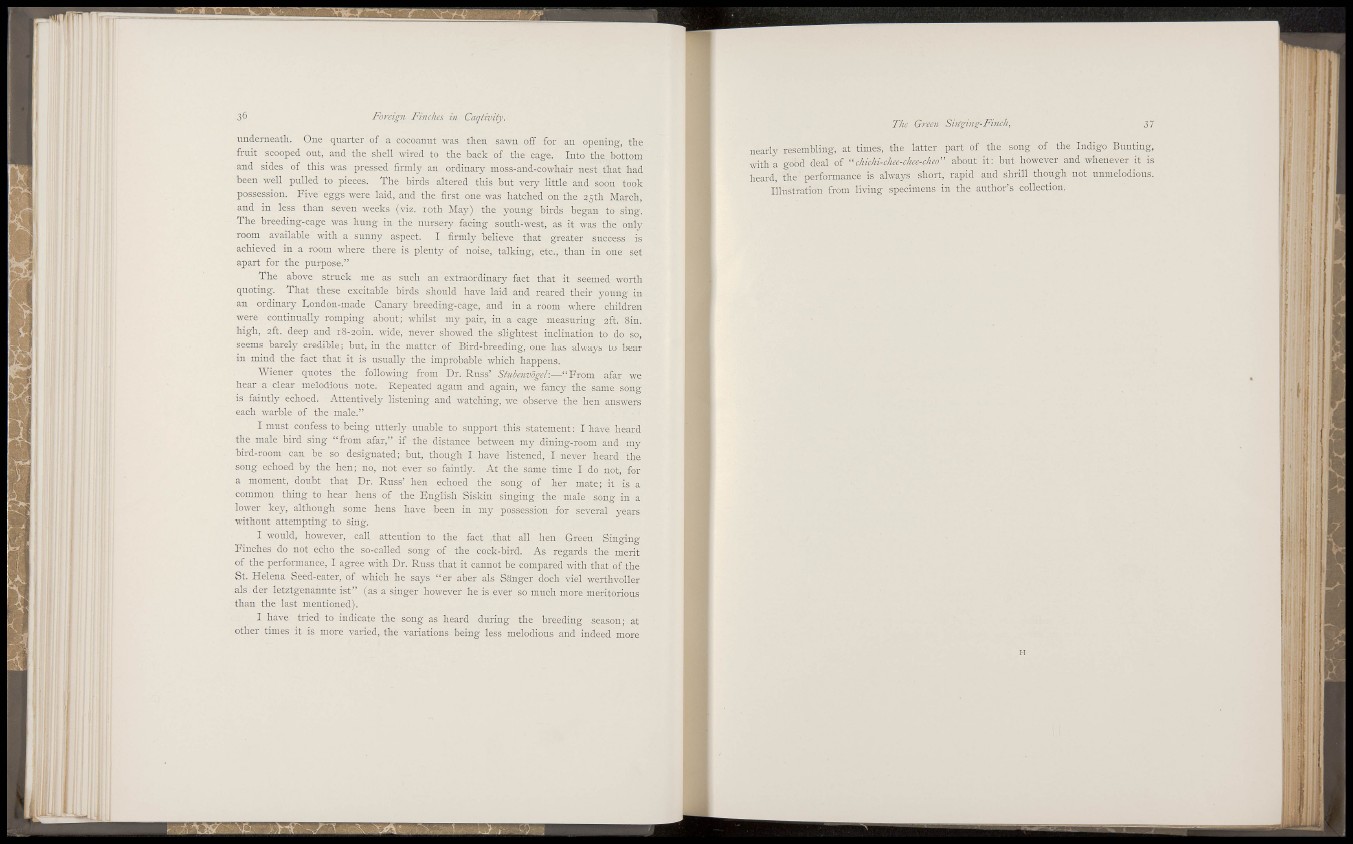
w n r i j l , ;
. I
äiifi
36 Foreign Fmchcs in Caqtivity.
imdemeath. One quarter of a cocoanut was tlien sawn off for an opening, tlie
fruit scooped out, and the shell wired to the back of the cage. Into the bottom
and sides of this was pressed finnly an ordinarj^ moss-and-cowhair nest that had
been well pulled to pieces. The birds altered this but very little and soon took
possession. Five eggs were laid, and the first one was hatched on the 25th March,
and in less than seven weeks (viz. loth May) the young birds began to sing.
The breeding-cage was hung iu the nursery facing south-west, as it was the only
room available with a sunny aspect. I firmly believe that greater success is
achieved in a room where there is plenty of noise, talking, etc., than in one set
apart for the purpose."
The above struck me as such an extraordinaiy fact that it seemed worth
c^uoting. That these excitable birds should have laid and reared their young in
an ordinary London-made Canary breeding-cage, and in a room where children
were continually romping about; whilst my pair, in a cage measuring 2ft. 8in.
high, 2ft. deep and i8-2oin. wide, never showed the slightest inclination to do so,
seems barely credible; but, in the matter of Bird-breeding, one has always to bear
in mind the fact that it is usually the improbable which happens.
Wiener quotes the following from Dr. Russ' Siubenmgel\—"From afar we
hear a clear melodious note. Repeated again and again, we fancy the same song
is faintly echoed. Attentively listening and watching, we observée the hen answers
each warble of the male."
I must confess to being utterly unable to support this statement : I have heard
the male bird sing "from afar," if the distance between my dining-room and my
bird-room can be so designated; but, though I have listened, I never heard the
song echoed by the hen; no, not ever so faintly. At the same time I do not, for
a moment, doubt that Dr. Russ' hen echoed the song of her mate; it is a
common thing to hear hens of the English Siskin singing the male song in a
lower key, although some hens have been in my possession for several years
withotit attempting to sing.
I would, however, call attention to the fact .that all hen Green Singing
Finches do not echo the so-called song of the cock-bird. As regards the merit
of the perfoiTuance, I agree with Dr. Russ that it cannot be compared with that of the
St. Helena Seed-eater, of which he says "er aber als Sanger doch viel werthvoller
als der letztgenannte ist" (as a singer however he is ever so much more meritorious
than the last mentioned).
I have tried to indicate the song as heard during the breeding season; at
other times it is more varied, the variations being less melodious and indeed more
The Green Sin'ging-Fineh, 37
nearly' resembling, at times, the latter part of the song of the Indigo Bunting,
with a good deal of "e/iieki-ehee-ehee-eheo" about it; but however and whenever it is
heard, the performance is always short, rapid and shrill though not unmelodious.
Illustration from living specimens in the author's collection.
I
il!
lii
i-
KÎ
ir
ti
r ! i!
Si
H i^'lîlH'
i, m^s
m